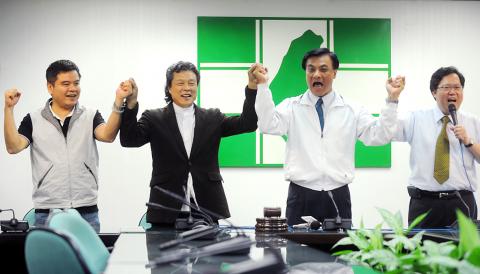The Democratic Progressive Party (DPP) yesterday finalized its 34-member legislators-at-large list for the legislative elections in January, filling the No. 3 spot after the original nominee withdrew.
The DPP reaffirmed that the list would remain unchanged, as it hoped to put an end the criticisms that have surrounded the nominations.
The party nominated Wu Yi-chen (吳宜臻), a lawyer of Hakka descent and an advocate for women’s rights, to fill the spot vacated by Cheng Su-hua (鄭素華), who withdrew her nomination because of criticism related to her previous violation of an election law.

Photo: Wang Yi-sung, Taipei Times
“The meeting reaffirmed that this will be the final version of the list and it will remain unchanged,” DPP spokesperson Cheng Wen-tsang (鄭文燦) said after the DPP Central Executive Committee meeting, adding that all party members and supporters were encouraged to “look forward from now on — with exactly six months left before the Jan. 14 elections.”
The last thing the DPP and its supporters want to see are the presidential and legislative elections lost because of “internal division and a lack of solidarity,” Cheng said.
Since the list was released on June 29, some academics, supporters and DPP members have criticized the nominations, saying that they failed to appropriately represent the disadvantaged, underprivileged classes and academia. The nominations also caused party infighting because several senior politicians and representatives of nongovernmental organizations were omitted.
To minimize any damage the internal strife might have caused, the DPP also announced that it had launched two investigations.
The party’s Arbitration Committee will reviews a case brought up by DPP Legislator Wang Sing-nan (王幸男), who has accused party caucus whip Ker Chien-ming (柯建銘) of misconduct and asked him to withdraw from the legislators-at-large race, DPP Secretary-General Su Jia-chyuan (蘇嘉全) said.
Su added he would also convene a three-member special panel to investigate on allegation made by Tsai You-chuan (蔡有全), who has accused a number of unnamed legislator-at-large nominees based in New Taipei City (新北市) of having extramarital relationships.
Hung Chih-kun (洪智坤), a member of the DPP Central Executive Committee, who publicly voiced his displeasure over the nomination list, appeared to have toned down his words after the meeting, telling the media that he had volunteered to run for the party in one of the nine districts deemed “difficult.”
“If I were not able to represent the DPP as a legislator-at-large, I would rather throw myself into the election,” Hung said without specifying for which constituency he plans to contest.
A total of 73 single-member constituencies will be up for grabs on Jan. 14.
Meanwhile, the DPP announced that it nominated singer-turned-politician Yang Lieh (楊烈) to run in Taipei City’s first electoral district. Yang, once a popular singer, will run against the Chinese Nationalist Party’s (KMT) Ting Shou-chung (丁守中) for the Beitou (北投)-Tianmu (天母) legislative seat.
The DPP said its national party congress, which will serve as a rally for the presidential ticket is tentatively scheduled for Aug. 28.

Beijing could eventually see a full amphibious invasion of Taiwan as the only "prudent" way to bring about unification, the US Department of Defense said in a newly released annual report to Congress. The Pentagon's "Annual Report to Congress: Military and Security Developments Involving the People's Republic of China 2025," was in many ways similar to last year’s report but reorganized the analysis of the options China has to take over Taiwan. Generally, according to the report, Chinese leaders view the People's Liberation Army's (PLA) capabilities for a Taiwan campaign as improving, but they remain uncertain about its readiness to successfully seize

Taiwan is getting a day off on Christmas for the first time in 25 years. The change comes after opposition parties passed a law earlier this year to add or restore five public holidays, including Constitution Day, which falls on today, Dec. 25. The day marks the 1947 adoption of the constitution of the Republic of China, as the government in Taipei is formally known. Back then the Chinese Nationalist Party (KMT) governed China from Nanjing. When the KMT, now an opposition party in Taiwan, passed the legislation on holidays, it said that they would help “commemorate the history of national development.” That

Taiwan has overtaken South Korea this year in per capita income for the first time in 23 years, IMF data showed. Per capita income is a nation’s GDP divided by the total population, used to compare average wealth levels across countries. Taiwan also beat Japan this year on per capita income, after surpassing it for the first time last year, US magazine Newsweek reported yesterday. Across Asia, Taiwan ranked fourth for per capita income at US$37,827 this year due to sustained economic growth, the report said. In the top three spots were Singapore, Macau and Hong Kong, it said. South

HORROR STORIES: One victim recounted not realizing they had been stabbed and seeing people bleeding, while another recalled breaking down in tears after fleeing A man on Friday died after he tried to fight the knife-wielding suspect who went on a stabbing spree near two of Taipei’s busiest metro stations, Taipei Mayor Chiang Wan-an (蔣萬安) said. The 57-year-old man, identified by his family name, Yu (余), encountered the suspect at Exit M7 of Taipei Main Station and immediately tried to stop him, but was fatally wounded and later died, Chiang said, calling the incident “heartbreaking.” Yu’s family would receive at least NT$5 million (US$158,584) in compensation through the Taipei Rapid Transit Corp’s (TRTC) insurance coverage, he said after convening an emergency security response meeting yesterday morning. National